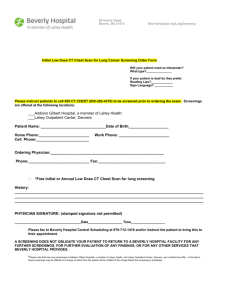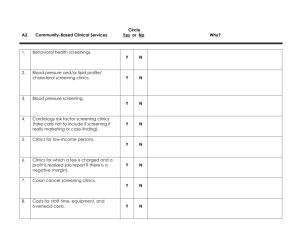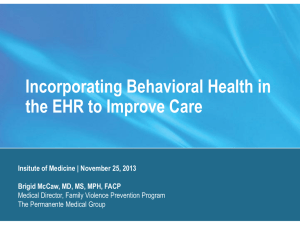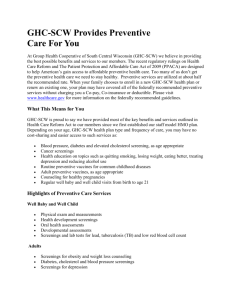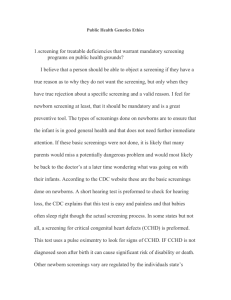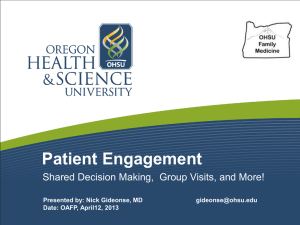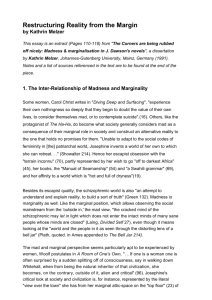Maternal Medical Home - Transformation Center
advertisement
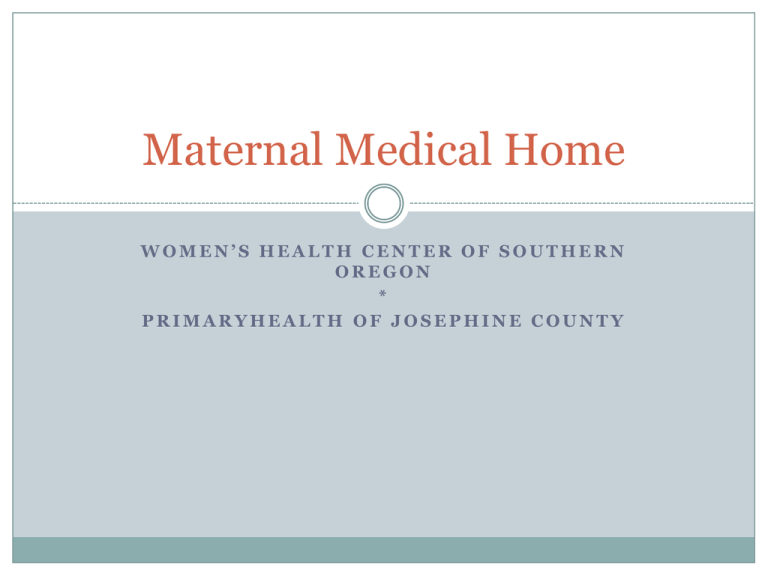
Maternal Medical Home WOMEN’S HEALTH CENTER OF SOUTHERN OREGON * PRIMARYHEALTH OF JOSEPHINE COUNTY Background Women's Health Center of Southern Oregon (WHCOSO) is located in Josephine County, a large rural county in Southern Oregon. WHCOSO is the sole OB/GYN clinic in the county. WHCOSO has 6 OB/GYNs and 2 NPs. A specialist in MFM practices from WHCOSO ½ day each week. There are two CCOs in Josephine County, AllCare and PrimaryHealth. Josephine County has high rates of poverty, drug and alcohol abuse, and tobacco addiction, all of which are risk factors for healthy birth outcomes. “What if we could seize the window of opportunity presented to us in pregnancy, and use this to help make moms, babies, and families healthier?” Vision “The intention of the Maternal Medical Home is to facilitate the coordination of a collaborative team of providers and staff, both internal and external, to meet the special needs of each woman during her pregnancy. Pregnant women seeking obstetrical care at WHCOSO will receive an experience of care, which extends beyond the traditional obstetrical care model. The goals of the MMH are to improve birth outcomes through increased compliance, education, and outreach, focusing care management resources on those women at highest risk.” Paradigm Shifts in the MMH Current State Future State Characteristics 1 Individual Focus Population Focus • • Focus teams on a panel of patients Risk Stratification 2 Fee for Service Global Budget • • Supplemental Payment Models Understanding the costs of pregnancy 3 Incident Focus Episode of Care; Preconception-60 Days Postpartum • • Early Entry to Care Whole person healthcare including screenings and follow up actions 4 Isolated Care Silos Integrated Care • Effective transitions and collaborations of care between PCP, OB, Baby Doctor, Specialists Effective integration with other health providers (Behavioral Health, A&D) • 5 Individual Provider/Pt Relationship Team Based Care • • • Addition of Health Coach and Co-Located BH therapist Use of staff to the height of their licensure Pt engagement 6 Individual Provider Preferences Evidence Based, Highly Reliable Quality Measured • • Use of protocols for outreach, intake and pt engagement Structured processes and quality outcomes measured 7 Information isolation between organizations Information sharing between multiple organizations • Real time sharing of health information between organizations : PCP, Hospital, Specialists, etc. 8 Provider effectiveness based on productivity Provider effectiveness based on population metrics • • Data Non-visit based tools (web, email, etc) Support for the Pilot from Community Partners Resources from Community Partnerships and CCOs: Options for Southern Oregon (Community Mental Health Program) • Provides a licensed mental health therapist who is co-located at the clinic ½ day each week PrimaryHealth of Josephine County • Financial support in the form of a risk-stratified supplemental PMPM payment for qualifying patients (APM pilot) Educational resources directed towards medical home transformation and PCPCH certification • AllCare • • Sponsors a full-time health coach that is out stationed at WHCOSO and works will all patients Provided assistance with PCPCH certification “We needed both staff and financial resources to support our efforts.” A Few Accomplishments Implementation of Team Based Care, including direct access for patients to the team. Development of a MMH leadership team. Development of a Data strategy. Implementation of standard screening protocols, and also protocols for positive screenings. Implementation of non-traditional staff support positions (such as a Health Coach). Became certified as a Tier 3 PCPCH in 2013. Non-Traditional Staff Positions High Risk Coordinator Meets with all newly pregnant patients Administers screening (5P’s) for Alcohol, Drugs, Tobacco, Domestic Violence and Depression. Institutes protocols for positive screenings (whether related to medical or social/environmental factors) Provides orientation to team based care Health Coach Follow-up on all positive screenings Health Coaching and Care Coordination throughout the pregnancy for high risk mothers Helps coordinate all members of the care team Visit at 36-wks with all pregnant mothers to assist with planning, teaching, and coordination of care Mental Health Therapist On-site behavioral health support Based on a brief therapy model Data “Aligning the data strategy to your overall goals is incredibly important.” Examples of measures used by WHCOSO: Early entry to care SBIRT (Alcohol and Drug Screening) Early elective delivery Depression screening Early Success in Depression Screening Patients with Depression Screening Completed and Documented 120% 100% 100% 99% 84% 80% 60% 40% 20% 20% 0% 13-Jun 13-Jul 13-Sep 13-Nov Protocols “We learned quickly that, while we had great protocols for high risk medical complications, we did NOT have them for things like positive depression screenings. We created those protocols and shared responsibility with all members of the team, not just the doctor. Now it is clear what each person does when we have a positive screening.” Involvement in Community Efforts Opiate Prescribers Group Perinatal Task Force Jefferson Health Information Exchange CCO Governance (Both CCOs) PrimaryHealth’s Medical Home Leadership Group Maternal Medical Home: A Work in Progress “The further I get into this, the more I realize we will never be done. Sometimes I feel like we are just barely at the tip of the iceberg with this transformation. It is hard to reflect on the progress that has been made when there is so much left to do. But I have this vision in my mind, of how it could be if all the pieces were there and in place. It’s slow going, but we are chipping away at it one piece at a time.” Contact Information Jennifer Johnstun, RN PrimaryHealth jen@ohms1.com Lisa Solomon, CEO Women’s Health Center of Southern Oregon lisas@womenshealthso.com
